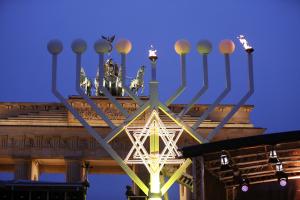Israel was attacked from Iranian territory with over 300 missiles, including 170 drones, 120 ballistic missiles and 30 cruise missiles. In total, more than 65 tonnes of explosives were aimed at Israel. According to Iranian sources, the main targets of the attack were an Israeli intelligence centre on Mount Hermon in the north and the Nevatim airbase in the south. Nevertheless, more than 700 missile alarms were triggered during the attack, including in Jerusalem, where missiles were intercepted even over the Al-Aqsa Mosque and the Israeli parliament. Together with the USA, the United Kingdom, France and Jordan, the Israeli army was able to fend off 99 per cent of the missiles, with the David Sling and Arrow 3 systems being used successfully alongside the Iron Dome.
The Islamic Republic of Iran, which had previously initiated attacks on Israel primarily through the Houthi militias in Yemen, Hezbollah in Lebanon and Iranian groups in Syria and Lebanon, dared to break the dam on 14 April and attacked Israel directly from its territory. This was an attack with an announcement, as the first warnings about a possible Iranian attack on Israel had already been circulating 48 hours in advance. The Israeli army and its allies were therefore well prepared for the defence. The Iranian regime, which is said to have informed the USA via Turkey and/or Switzerland of the impending attack on Israel, sees the attack on 14 April as a direct response to the attack on senior generals of the Islamic Revolutionary Guards in the Iranian consulate in Damascus, which was presumably carried out by Israel on 1 April. On the night of 14 April, Iranian officials officially announced that it was a retaliatory strike in response to the attack on their consulate and that the operation was over for Iran with the attack - unless the USA or Israel launched a counter-response.
For Israel, which has been at war with Hamas in the Gaza Strip for over six months, the operation shows the following: The Iranian attack was successfully repelled without any Israeli casualties. This shows how well equipped and ready for defence the Israeli army and its defence systems are in an emergency. It is also clear that Israel has reliable partners at its side, first and foremost the USA. But Israel also has important regional partners, as demonstrated by Jordan's role in the defence against Iranian drones. It remains to be seen how prepared Israel would be to defend itself in the event of an unannounced surprise attack by Iran - especially if the Hezbollah militia in Lebanon with its more than 150,000 rockets and other regional militias were also part of a coordinated attack.
Domestically, Israel is now discussing how to respond to the Iranian attack. While Defence Minister Gallant and Benny Gantz, as members of the War Cabinet, are taking a more moderate stance, advocating a strategic alliance against Iran and speaking out against a direct military strike against Iran at the present time, the ultra-right forces in the government, above all the Minister of National Security Ben-Gvir and Finance Minister Smotrich, are in favour of an open escalation with Iran and are calling for a tough direct military response. Politicians such as Gideon Saar speak of the "strategic flexibility" that Israel now has and demand that the war against Hamas must first be brought to an end and, above all, the return of the more than 100 hostages held by Hamas must be prioritised.
In the end, only the war cabinet will decide. Prime Minister Netanyahu has not yet commented on when and how Israel might respond to the Iranian attack. The USA's stance of not participating in a military response to the Iranian attack is likely to have the greatest influence on Israel's position. Another decisive factor will be how the rocket fire on northern Israel by Hezbollah, which has been ongoing for months, will continue to develop, as domestic political pressure is mounting in Israel to decide the fate of the more than 80,000 Israelis evacuated from the north since 7 October by the summer. Tense days therefore remain in Israel.





